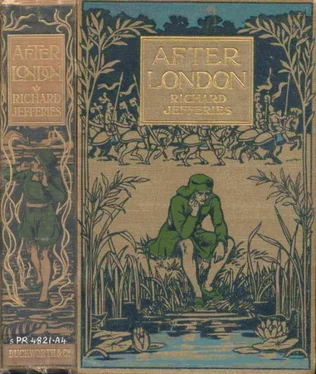Richard Jefferies - After London
Здесь есть возможность читать онлайн «Richard Jefferies - After London» весь текст электронной книги совершенно бесплатно (целиком полную версию без сокращений). В некоторых случаях можно слушать аудио, скачать через торрент в формате fb2 и присутствует краткое содержание. Город: London, Год выпуска: 1905, Издательство: Duckworth & Co., Жанр: sf_postapocalyptic, на английском языке. Описание произведения, (предисловие) а так же отзывы посетителей доступны на портале библиотеки ЛибКат.
- Название:After London
- Автор:
- Издательство:Duckworth & Co.
- Жанр:
- Год:1905
- Город:London
- ISBN:нет данных
- Рейтинг книги:4 / 5. Голосов: 1
-
Избранное:Добавить в избранное
- Отзывы:
-
Ваша оценка:
- 80
- 1
- 2
- 3
- 4
- 5
After London: краткое содержание, описание и аннотация
Предлагаем к чтению аннотацию, описание, краткое содержание или предисловие (зависит от того, что написал сам автор книги «After London»). Если вы не нашли необходимую информацию о книге — напишите в комментариях, мы постараемся отыскать её.
(1885), set in a future in which urban civilization has collapsed after an environmental crisis.” (From
).
This eBook is for the use of anyone anywhere at no cost and with almost no restrictions whatsoever. You may copy it, give it away or re-use it under the terms of the Project Gutenberg License included with this eBook or online at
* * *
After London — читать онлайн бесплатно полную книгу (весь текст) целиком
Ниже представлен текст книги, разбитый по страницам. Система сохранения места последней прочитанной страницы, позволяет с удобством читать онлайн бесплатно книгу «After London», без необходимости каждый раз заново искать на чём Вы остановились. Поставьте закладку, и сможете в любой момент перейти на страницу, на которой закончили чтение.
Интервал:
Закладка:
It is observed that whatever mischief the Bushman commits, he never sets fire to any ricks or buildings; the reason is because his nature is to slink from the scene of his depredations, and flame at once attracts people to the spot. Twice the occurrence of a remarkably severe winter has caused the Bushmen to flock together and act in an approach to concert in attacking the enclosures. The Bushmen of the north, who were even more savage and brutal, then came down, and were with difficulty repulsed from the walled cities. In ordinary times we see very little of them. They are the thieves, the human vermin of the woods.
Under the name of gipsies, those who are now often called Romany and Zingari were well known to the ancients. Indeed, they boast that their ancestry goes back so much farther than the oldest we can claim, that the ancients themselves were but modern to them. Even in that age of highest civilization, which immediately preceded the present, they say (and there is no doubt of it) that they preserved the blood of their race pure and untainted, that they never dwelt under permanent roofs, nor bowed their knees to the prevalent religion. They remained apart, and still continue after civilization has disappeared, exactly the same as they were before it commenced.
Since the change their numbers have greatly increased, and were they not always at war with each other, it is possible that they might go far to sweep the house people from the land. But there are so many tribes, each with its king, queen, or duke, that their power is divided, and their force melts away. The ruler of the Bushman families is always a man, but among the gipsies a woman, and even a young girl, often exercises supreme authority, but must be of the sacred blood. These kings and dukes are absolute autocrats within their tribe, and can order by a nod the destruction of those who offend them. Habits of simplest obedience being enjoined on the tribe from earliest childhood, such executions are rare, but the right to command them is not for a moment questioned.
Of the sorcerers, and particularly the sorceresses, among them, all have heard, and, indeed, the places where they dwell seem full of mystery and magic. They live in tents, and though they constantly remove from district to district, one tribe never clashes with or crosses another, because all have their especial routes, upon which no intrusion is ever made. Some agriculture is practiced, and flocks and herds are kept, but the work is entirely done by the women. The men are always on horseback, or sleeping in their tents.
Each tribe has its central camping-place, to which they return at intervals after perhaps wandering for months, a certain number of persons being left at home to defend it. These camps are often situated in inaccessible positions, and well protected by stockades. The territory which is acknowledged to belong to such a camp is extremely limited; its mere environs only are considered the actual property of the tribe, and a second can pitch its tents with a few hundred yards. These stockades, in fact, are more like store-houses than residences; each is a mere rendezvous.
The gipsies are everywhere, but their stockades are most numerous in the south, along the sides of the green hills and plains, and especially round Stonehenge, where, on the great open plains, among the huge boulders, placed ages since in circles, they perform strange ceremonies and incantations. They attack every traveller, and every caravan or train of waggons which they feel strong enough to master, but they do not murder the solitary sleeping hunter or shepherd like the Bushmen. They will, indeed, steal from him, but do not kill, except in fight. Once, now and then, they have found their way into towns, when terrible massacres have followed, for, when excited, the savage knows not how to restrain himself.
Vengeance is their idol. If any community has injured or affronted them, they never cease endeavouring to retaliate, and will wipe it out in fire and blood generations afterwards. There are towns which have thus been suddenly harried when the citizens had forgotten that any cause of enmity existed. Vengeance is their religion and their social law, which guides all their actions among themselves. It is for this reason that they are continually at war, duke with duke, and king with king. A deadly feud, too, has set Bushman and gipsy at each other’s throat, far beyond the memory of man. The Romany looks on the Bushman as a dog, and slaughters him as such. In turn, the despised human dog slinks in the darkness of the night into the Romany’s tent, and stabs his daughter or his wife, for such is the meanness and cowardice of the Bushman that he would always rather kill a woman than a man.
There is also a third class of men who are not true gipsies, but have something of their character, though the gipsies will not allow that they were originally half-breeds. Their habits are much the same, except that they are foot men and rarely use horses, and are therefore called the foot gipsies. The gipsy horse is really a pony. Once only have the Romany combined to attack the house people, driven, like the Bushmen, by an exceedingly severe winter, against which they had no provision.
But, then, instead of massing their forces and throwing their irresistible numbers upon one city or territory, all they would agree to do was that, upon a certain day, each tribe should invade the land nearest to it. The result was that they were, though with trouble, repulsed. Until lately, no leader ventured to follow the gipsies to their strongholds, for they were reputed invincible behind their stockades. By infesting the woods and lying in ambush they rendered communication between city and city difficult and dangerous, except to bodies of armed men, and every waggon had to be defended by troops.
The gipsies, as they roam, make little secret of their presence (unless, of course, intent upon mischief), but light their fires by day and night fearlessly. The Bushmen never light a fire by day, lest the ascending smoke, which cannot be concealed, should betray their whereabouts. Their fires are lit at night in hollows or places well surrounded with thickets, and, that the flame may not be seen, they will build screens of fir boughs or fern. When they have obtained a good supply of hot wood coals, no more sticks are thrown on, but these are covered with turf, and thus kept in long enough for their purposes. Much of their meat they devour raw, and thus do not need a fire so frequently as others.
CHAPTER IV
THE INVADERS
Those who live by agriculture or in towns, and are descended from the remnant of the ancients, are divided, as I have previously said, into numerous provinces, kingdoms, and republics. In the middle part of the country the cities are almost all upon the shores of the Lake, or within a short distance of the water, and there is therefore more traffic and communication between them by means of vessels than is the case with inland towns, whose trade must be carried on by caravans and waggons. These not only move slowly, but are subject to be interrupted by the Romany and by the banditti, or persons who, for moral or political crimes, have been banished from their homes.
It is in the cities that cluster around the great central lake that all the life and civilization of our day are found; but there also begin those wars and social convulsions which cause so much suffering. When was the Peninsula at peace? and when was there not some mischief and change brewing in the republics? When was there not a danger from the northern mainland?
Until recent years there was little knowledge of, and scarcely any direct commerce or intercourse between, the central part and the districts either of the extreme west or the north, and it is only now that the north and east are becoming open to us; for at the back of the narrow circle or cultivated land, the belt about the Lake, there extend immense forests in every direction, through which, till very lately, no practicable way had been cut. Even in the more civilized central part it is not to this day easy to travel, for at the barriers, as you approach the territories of every prince, they demand your business and your papers; nor even if you establish the fact that you are innocent of designs against the State, shall you hardly enter without satisfying the greed of the officials.
Читать дальшеИнтервал:
Закладка:
Похожие книги на «After London»
Представляем Вашему вниманию похожие книги на «After London» списком для выбора. Мы отобрали схожую по названию и смыслу литературу в надежде предоставить читателям больше вариантов отыскать новые, интересные, ещё непрочитанные произведения.
Обсуждение, отзывы о книге «After London» и просто собственные мнения читателей. Оставьте ваши комментарии, напишите, что Вы думаете о произведении, его смысле или главных героях. Укажите что конкретно понравилось, а что нет, и почему Вы так считаете.












